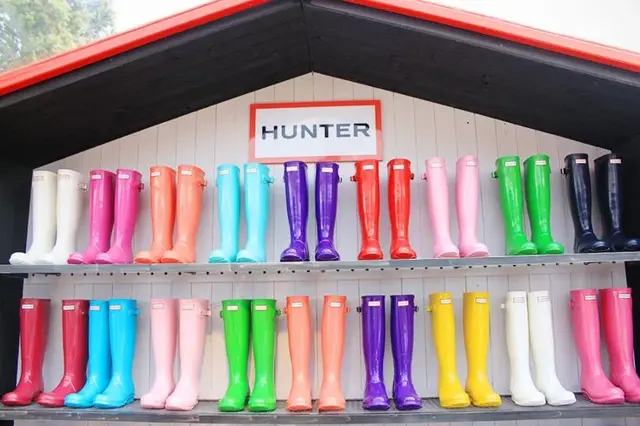Get more Retail Sector insight from HSO
Dynamics Matters Podcast: Ep 35 -
How to choose the right finance system
How to choose the right finance system
With special guest Mark Reed, who is the CFO of HSO customer Hunter Boot
✔ What was not working for Hunter Boot?
✔ Why Hunter Boots selected Dynamics 365?
✔ Why Hunter Boot selected HSO as a Partner?

Podcast summary:
How retailers can get ahead and stay ahead
Welcome everyone to the HSO Dynamics matters podcast. Your regular sonic dive into the world of Microsoft technology-related matters and much more besides. I’m your host Michael Lonnon, and today I’m delighted to be joined by Mark Reed, who is the CFO of HSO customer Hunter Boot.
If you’ve not got yourself a pair of Hunter Boots I highly recommend them. Just this weekend my wife got a pair and the box they come in is fantastic! The boots are great too of course.
Anyway, the system used to manage the transaction was built on Dynamics 365, and so I wanted to find out from Mark the types of things you should look out for that indicate the need to change, in this case, a finance system. And advice he might have on choosing the system of best fit for your organisation. So, grab a brew, sit back, relax, and enjoy the show.
Transcript
Michael Lonnon 00:00
Pint of Guinness or pint of Carling?
Colm McArdle 00:03
Carling
Michael Lonnon 00:05
Really?
Colm McArdle 00:06
Controversial.
Michael Lonnon 00:07
Yes, I thought I had a banker there were the Guinness question. Bath or shower?
Colm McArdle 00:12
Shower
Michael Lonnon 00:13
save or spend?
Colm McArdle 00:14
Spend.
Michael Lonnon 00:18
Improve what you have or replace what you have?
Colm McArdle 00:21
Replace?
Michael Lonnon 00:23
Oh really?
Colm McArdle 00:24
Yeah, I’m guilty of frivolousness.
Michael Lonnon 00:30
I’ll ask you this if you put a hole in the wall, would you buy a picture to cover the hole or would you fix the hole?
Colm McArdle 00:40
I would fix the hole? I couldn’t live with myself.
Michael Lonnon 00:49
But happy to spend
Colm McArdle 00:52
Pay somebody to fix the hole.

Customer Case: Hunter Boot
A vastly improved legacy IT system that got their digital transformation rolling. HSO improved its legacy IT system that disrupted business continuity and held the brand back.
Michael Lonnon
I wanted to get from your perspective as a CFO, your experience of bringing in finance systems. What are the key indicators to show you might need a new system or you need to change, or you might need to upgrade? What are the key indicators?
Mark Reed
I think from my experience, where we’ve had disjointed systems. I’ve been in a business once before where we had ERP that wasn’t integrated with a finance system, and it was clunky, and this brought about change. The other thing would be where you’ve got systems, which are not meeting your requirements, both in terms of the geographic spread of the business, the multicurrency nature and I also suppose the performance and sizing capabilities.
Michael Lonnon
Is it less based on technical capabilities and more in in changing business needs? Or perhaps a bit of both?
Mark Reed
I’d say probably a bit of both.
Michael Lonnon
When you’re looking at this and you’ve had the indicators coming in and built up the business case, what are the main considerations when you’re choosing a finance system?
Mark Reed
A system, which has a defined roadmap going forward. There’s a lot of development and change happening out in the market, and businesses are moving very quickly. I would want something that has a defined roadmap, that has flexibility that we can add to and we can improve upon as the partner brings on line more modules and capabilities.
Michael Lonnon
Those capabilities and that roadmap is about being able to adapt to future changes, because something without a roadmap is going to be less flexible in the future when things evolve?
Mark Reed
Someone explained to me once that you’re not going in a straight line so it’s a bit like a river, and it sort of meanders along and you need to be able to have that flexibility to be able to maintain the direction of travel but move along the course of the river and add things and improve things along the way as opposed to being structurally blocked in what you do. That’s where we’ve found ourselves at the moment, in my current role, where we are locked into to the system, we don’t have that flexibility, and we can’t move.
Michael Lonnon
That’s again one of those indicators that change is necessary as the business is evolving or growing. Whatever it is, you’re locked in a system that you can’t get off, and you realise you’ve got to come off it? Is that big decision to make?
Mark Reed
For us, it’s been a fairly big decision in that there’s a fair bit of capital involved, there’s always pressure on investment, depending on where you are in the investment cycle, and the need to sweat what you’ve got. So, it has been quite a difficult decision for us.
Michael Lonnon
Just a curiosity then how do you, in cases like this, which isn’t uncommon, and is understandable, how do you set the business case? Or how do you underline the business case, when cost pressures are such a big thing? How do you justify it?
Mark Reed
It’s all linking into the three-year plan that we have. The goals, aspirations, the geographical spread that we need and the ability to actually deliver those and deliver to that plan. We have we had a bit of a change in shareholding structure, which did help in my current role?
Michael Lonnon
I’m guessing it’s a lot about aligning to a plan and having the right people who understand the plan, get the vision, and buy into what you’re proposing from a system point of view and change point of view.

Is your retail business data rich but analysis poor?
In 10 minutes, this whitepaper shows you how to have only one version of the truth (data) and make the right decisions for your retail business.

Mark Reed
Yes, and understand the enablers that are needed to drive that plan out. I also think, an understanding of how important technology is becoming. One of our strategies is to be digitally focused and off the back of that comes a joined-up system which is connected with your partners and hence it gives you that flexibility to collect a lot of data, analyse it and draw the insights and the value
Michael Lonnon
Data comes up in many of the podcasts. I think people understand its value in helping build towards a three-year plan, five-year plan ten-year plan. From your organisation and from your perspective, how important is data in the success of Hunter Boot?
Mark Reed
Part of our strategy now is to focus more on it and to use it to support our decision-making and that also then comes on the system side of things. We have a Power BI platform in place, and we are feeding a lot of information into that generating dashboards, leading KPIs and the like to enable us to manage that business on a day-to-day basis. With the amount of change that’s happening, you’ve got to consistently look at those KPIs, and particularly the leading ones to inform your direction of travel.
Michael Lonnon
With something like a three-year plan, where things have been changing so fast currently, and they still really are, does it make you change the way you’re thinking about the systems and your approach to managing the business?
Mark Reed
Very much so. Whereas in the past, you do a budget, and you probably do a couple of quarterly forecasts, to inform your direction of travel, you’ve got to do that on a more regular basis. We find we are focusing a lot more frequently on this now, and we need a system, which enables us to have that flexibility and ability to do that and given the amount of change that’s happening, we foresee is going to continue.
Michael Lonnon
From a system perspective, and from your role as a CFO, are there any specific or particular technical needs or must have this within a new system?
Mark Reed
I would say a cloud-based solution something which is assessed on a SAS platform where we can try to keep as close to the core as possible with minimal customizations so that we can benefit from that upgrade path and the new technology and modules that come into play as we progress.
Michael Lonnon
The perspective of keeping close to the core, that’s really important, isn’t it? That helps from a speed of deployment and a cost management perspective, because you’re taking a lot of the system, as it stands today, with limited customisation to how your organisation works is that the reason why you tend to go with something that’s close to the core?
Mark Reed
Yes, and from previous experience, we’ve run a lot of customisations, and that does inhibit you quite substantially in the process. I think it’s a tough one because you’ve got to make sure you’ve got the functionality and the ability to run the business in an efficient manner, which is normally what drives out some of those customisations but I think it’s key to have a partner that has a roadmap, and has got some of those areas in their pipelines to bring development on stream later.
Michael Lonnon
What are the points to assess when looking at different systems? Is it things like, cloud SAS enabled, can we take most of it that sits at the core?
Mark Reed
There are key pain points that we’ve got now, and it would be looking at how those friction points would be handled in the new system, and whether it has the capabilities to ease those friction points would be the key thing to look at.
Michael Lonnon
For anybody else looking at a new finance system, would you have any advice as to where they should start and how they should go about it?
Mark Reed
I would probably look at those friction points and assess which options out there in the market are going to best address those and then select a good partner to work with and somebody that’s got a defined roadmap that can address some of those pain points in the future, if not immediately.
Summary
Flexibility is key to Mark’s and Hunter Boots selection of a finance system. So as the business grows and changes, and as the needs of their customers evolve, the requirement of the system is able to adapt. And limiting customisation and maintaining something close to the core also prevents Hunter Boot from being inhibited in the future.
For Mark it is important to work with a partner that has a roadmap of new functionality you can benefit from down the line, but which won’t cause significant disruption when brought in. Another reason why a cloud solution was chosen.
This provided efficiency, future scalability, and additional capability to support Hunter Boot into the future – and were key reasons behind Hunter Boots selection of Dynamics 365. I hope you enjoyed today’s episode!

